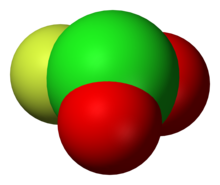Chloryl fluoride

| |
| Names | |
|---|---|
| Other names
chlorine dioxide fluoride
| |
| Identifiers | |
3D model (JSmol)
|
|
| ChemSpider | |
PubChem CID
|
|
CompTox Dashboard (EPA)
|
|
| |
| |
| Properties | |
| Template:ChlorineTemplate:OxygenTemplate:Fluorine | |
| Molar mass | 86.4502 g/mol |
| Density | 3.534 g/L |
| Melting point | −15 °C |
| Boiling point | −6 °C |
| Related compounds | |
Related compounds
|
Perchloryl fluoride |
Except where otherwise noted, data are given for materials in their standard state (at 25 °C [77 °F], 100 kPa).
| |
Chloryl fluoride is the chemical compound with the formula ClO2F. It is commonly encountered as side-product in reactions of chlorine fluorides with oxygen sources.[1] It is the acyl fluoride of chloric acid.
Preparation
ClO2F was first reported by Schmitz and Schumacheb in 1942, who prepared it by the fluorination of ClO2.[2] The compound is more conveniently prepared by treatment of sodium chlorate and chlorine trifluoride and purified by vacuum fractionation, i.e. selectively condensing this species separately from other products. This species is a gas boiling at −6 °C:
- 6 NaClO3 + 4 ClF3 → 6 ClO2F + 2 Cl2 + 3 O2 + 6 NaF
Structure
In contrast to O2F2, ClO2F is a pyramidal molecule. This structure is predicted by VSEPR. The differing structures reflects the greater tendency of chlorine to exist in positive oxidation states with oxygen and fluorine ligands. The related Cl-O-F compound perchloryl fluoride, ClO3F, is tetrahedral. The related bromine compound bromyl fluoride (BrO2F) adopts the same structure as ClO2F, whereas iodyl fluoride (IO2F) forms a polymeric substance under standard conditions.[3]
References
- ^ Chrisie, K. O.; Wilson, R. D.; Schack, C. J. "Chloryl fluoride" Inorganic Syntheses, 1986, volume 24, pages 3–5. ISBN 0-471-83441-6
- ^ Schmitz, H.; Schumacheb, H. J. "Über eine neue Reaktion des Chlordioxyds. Die Bildung einer Verbindung der Formel ClO2F" Zeitschrift für anorganische und allgemeine Chemie 1942, Volume 249, pp. 238–244. DOI 10.1002/zaac.19422490302
- ^ Holleman, A.F.; Wiberg, E.; Wiberg, N. (1995). Lehrbuch der anorganischen Chemie. de Gruyter. p. 501. ISBN 9783110126419. Retrieved 2015-02-20.
